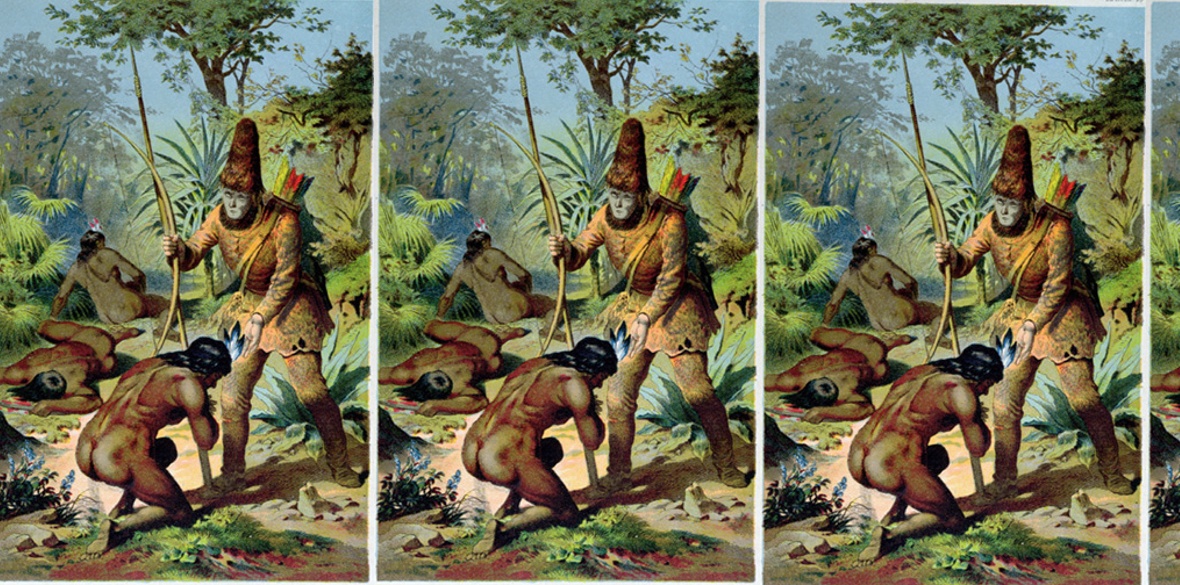This is the last article you can read this month
You can read more article this month
You can read more articles this month
Sorry your limit is up for this month
Reset on:
Please help support the Morning Star by subscribing here
IT IS 300 years since the publication of Daniel Defoe’s adventure novel, Robinson Crusoe.
It’s one of the biggest selling books by a British author and works as a gripping adventure for young readers.
But underneath the derring-do, jeopardy, solitude and survival is a story with underpinnings in colonialism, slavery and exploitation.
Modern media still mine this rich source of thrilling entertainment with recent popular TV programmes such as Bear Grylls’s Island Survival, Castaways, Survivor and Shipwrecked.
By the end of the 19th century, no book in English literary history had enjoyed more editions, spin-offs and translations than Robinson Crusoe, with more than 700 alternative versions, including illustrated children’s versions.
The now-forgotten term “Robinsonade” was coined to describe the Crusoe genre, which still flourishes and was more recently revived by Hollywood in the Tom Hanks film Castaway in 2000.
Two months before publishing his novel Defoe proposed that the South Sea Company, which had been founded eight years earlier to manage the national debt and supply the Spanish colonies with several thousand African slaves each year, should oversee the founding of a British colony at the mouth of the Orinoco River near the coast of present-day Venezuela.
His novel is set very near the same location and could be seen as a way of showing how British fortitude, resilience and hard work could make survival possible and enable an enterprising Englishman can prosper in seemingly hostile environments.
This romanticised ideal is part of a colonial narrative that went hand in glove with the slave trade, white supremacy and the entitlement of the upper class to seize and control whatever they wanted: people, land, countries, minerals, natural resources, precious metals and more.
The encounter with Man Friday is a seminal moment — probably the first black character to be given a realistic, individualised and humane portrayal in the English novel, Friday has a huge literary and cultural importance.
If Crusoe represents the first colonial mind in fiction, then Friday represents not just a Caribbean tribesman, but all the natives of America, Asia, and Africa who would later be oppressed in the age of European imperialism.
At the moment when Crusoe teaches Friday to call him “Master,” Friday becomes an enduring political symbol of racial injustice in a modern world critical of imperialist expansion.
Recent rewritings of the Crusoe story, like JM Coetzee’s Foe and Michel Tournier’s Friday, emphasise the sad consequences of Crusoe’s failure to understand Friday and suggest how the tale might be told very differently from the native’s perspective.
Aside from his importance to our culture, Friday is a key figure within the context of the novel. In many ways he is the most vibrant character in Robinson Crusoe, much more charismatic and colourful than his master.
Indeed, Defoe at times underscores the contrast between Crusoe’s and Friday’s personalities, as when Friday, in his joyful reunion with his father, exhibits far more emotion toward his family than Crusoe.
Whereas Crusoe never mentions missing his family or dreams about the happiness of seeing them again, Friday jumps and sings for joy when he meets his father, and this emotional display makes us see what is missing from Crusoe’s stodgy Christian heart.
Friday’s expression of loyalty in asking Crusoe to kill him rather than leave him is more heartfelt than anything Crusoe ever says or does.
Friday’s sincere questions to Crusoe about the devil, which Crusoe answers only indirectly and hesitantly, leave us wondering whether Crusoe’s knowledge of Christianity is superficial and sketchy in contrast to Friday’s full understanding of his own god Benamuckee.
In short, Friday’s exuberance and emotional directness often point out the wooden conventionality of Crusoe’s personality.
The text was first published in London by W Taylor on April 25 1719. This first edition credited the work’s fictional protagonist Robinson Crusoe as its author, and its title was The Life and Strange Surprizing Adventures of Robinson Crusoe of York, Mariner: Written by Himself.
It sold well; four months later, it was followed by The Further Adventures of Robinson Crusoe. A year later, riding high on the market, came Serious Reflections During the Life and Surprizing Adventures of Robinson Crusoe.
Most readers will only encounter the first edition. The author of this literary milestone is a hustler of nearly 60 years old originally named Daniel Foe (he added “De” to improve his social standing), a one-time journalist, pamphleteer, jack of all trades and spy.
This novel relates the story of a man’s shipwreck on a desert island for 28 years and his subsequent adventures.
Throughout its episodic narrative, Crusoe’s struggles with faith are apparent as he bargains with God in times of life-threatening crises, but time and again he turns his back after his deliverances.
He is finally content with his lot in life, separated from society, following a more genuine conversion experience.
The novel has been assumed to be based in part on the story of the Scottish castaway Alexander Selkirk, who spent four years stranded in the Juan Fernandex islands, but this experience is inconsistent with the details of the narrative.
The island Selkirk lived on was named Mas a Tierra (Closer to Land) at the time and was renamed Robinson Crusoe Island in 1966.
It has been supposed that Defoe may have also been inspired by the Latin or English translation of a book by the Andalusian-Arab Muslim polymath Ibn Tufail, who was known as “Abubacer” in Europe.
The Latin edition of the book was entitled Philosophus Autodidactus and it was an earlier novel that is also set on a deserted island.












